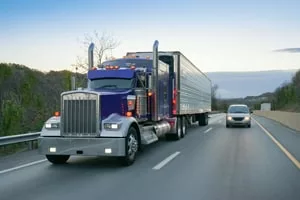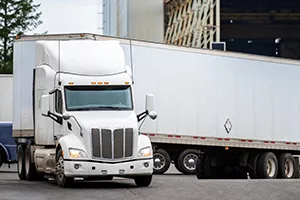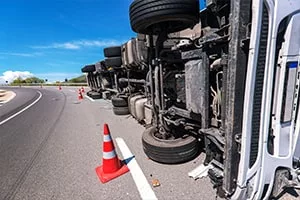
Tractor-trailer accidents are especially dangerous because these vehicles are longer, taller, heavier, and more powerful; provide worse vision for the driver; and are harder to maneuver than other vehicles on the road. That’s why a far greater percentage of tractor-trailer accidents result in fatalities or serious injuries than any other type of accident on American roads. According to the Illinois Department of Transportation, there were 12,267 tractor-trailer crashes in Illinois in 2018. And while these crashes accounted for only 3.1% of all injury crashes in Illinois, they accounted for 18.6% of crashes with serious injuries. One hundred and eight people were killed and 541 seriously injured in tractor-trailer crashes that same year, mostly pedestrians or the occupants of the other vehicle.
There are many reasons why tractor-trailer accidents happen. Many of the accidents are attributable to driver error, including situations where truck drivers:
Other tractor-trailer accidents result from trucking company negligence, including inadequate maintenance, failure to repair vehicles, or failure to secure cargo properly. Moreover, tractor-trailer accidents are exacerbated by the tractor-trailer’s size and power, relative to that of the average car with whom it shares the road:
Length and height: The average length of a tractor-trailer (including trailer) is 70-80 feet. That’s about 5 times the length (14.7 feet) of the average car. The average height of a tractor-trailer is 13.5 feet, which is more than twice the height of the average car.
The massive size of tractor-trailers means these vehicles are difficult to maneuver, even when road conditions are the safest, and their drivers most alert. These drivers must be experienced and incredibly careful to avoid life-endangering accidents.
Weight: Tractor-trailers are allowed to weigh up to a whopping 40 tons, or 80,000 pounds. That’s 16 times the weight of the average car. Needless to say, this extraordinary mismatch in weight of a tractor-trailer vs a car puts the passengers of the car in grave danger whenever the two vehicles collide.
Power: Given the size and weight of tractor-trailers, you would imagine it takes a very powerful engine to make them go. And you would be right. The average tractor-trailer has a 400-600 horsepower engine, compared to the 100-200 horsepower of the average car.
The sheer size and power of tractor-trailers create built-in dangers, which present serious threats to the passengers of other vehicles on the road:
Harder to stop: Even under safe road conditions, it takes a tractor-trailer 40% longer to stop than a car. Their sheer weight creates two dangers: it makes them harder to stop, and also makes them especially likely to cause serious injury if they do not stop in time, and strike a car, person, street sign or structure. The experienced, alert, and careful tractor-trailer driver will not engage in risky driving practices, such as tailgating a car, that makes the size and speed of the tractor-trailer potentially lethal. If you are driving a car that is being tailgated by a tractor-trailer, you must change lanes as promptly as you safely can, to take yourself and your passengers out of harm’s way. You do not want to find out the hard way that the driver of the tailgating tractor-trailer has not had enough sleep the previous night or does not have adequate experience with stopping his vehicle in time.

Wide Turns: A vehicle 70-80 feet long is going to take a lot more time and space than a 15-foot-long car to execute a safe turn. We have all seen these very long tractor-trailers do a wide turn: they take up two or more lanes, and generally need an intersection with no other vehicles near them to get the job done. For tractor-trailer drivers, turns require special care: they must wait for intersections to clear, and proceed with great caution, alert at all times for the presence of another vehicle whose driver has failed to appreciate what the tractor-trailer is trying to do, or how much space it needs. For drivers of those vehicles in the presence of a tractor-trailer trying to execute a wide turn, it’s important to back off a great distance.
Blind Spots: As with the driver of a car, the tractor-trailer driver is responsible for knowing what is going on all around him—front, back, and sides—at all times on the road. But this is easier said than done, and no driver of a car should assume that the driver of the tractor-trailer immediately in front of her car, or behind it, or to the side of it, has a perfect line of sight to, or is even paying attention to, all that is going on. Tractor-trailers have “blind spots”, which are areas where the driver of the very tall and very long tractor-trailer can easily fail to see a nearby vehicle. These “blind spots” are directly in front of the tractor-trailer; directly behind; and along its 70-80 foot sides. Small cars and motorcycles are particularly vulnerable to a life-threatening collision with a tractor-trailer if they are riding in one of these “blind spots”. This threat is especially acute when tractor-trailer drivers lose awareness, even for a second, of their surroundings. For this reason, car and motorcycle drivers must maintain a safe distance from all sides of a tractor-trailer, erring on the side of exaggerating the need for distance.
When the risks inherent in the sheer size, power and weight of tractor-trailers are combined with human error—such as distracted or aggressive driving, failure to respect the dangers of “blind spots”, or failure to adequately maintain the vehicle—these types of accidents occur:
Jackknifing: When the trailer swings out at an angle to the cab, it’s called “jackknifing”. The longer the tractor-trailer, the more vulnerable it is. Pressure suddenly applied to the brakes and turning too quickly, particularly on wet pavement, can cause jackknifing. Other drivers should keep their distance from tractor-trailers which are suddenly braking, turning, or driving on wet pavement. These moments are loaded with the potential for serious injury for all.
Rear-end collisions: There are, on average, some 33,000 rear-end collisions involving tractor-trailers every year in the United States. In most of these, the tractor-trailer rear-ends the car, and serious injury to the passengers of the car often results. Tractor-trailer drivers are responsible for keeping a safe distance behind all vehicles in front of them, taking into consideration the weight and length of the tractor-trailer, road conditions, driver alertness, etc. Of course, the driver of the car in front of the tractor-trailer must recognize when the tractor-trailer is too close behind, and change to a safer lane, as soon as reasonably possible to do so.
T-Bone accidents: These accidents result when two vehicles collide, creating a “T” shape. It is also referred to as a “side impact” collision. If either of the vehicles is a tractor-trailer, its size and weight almost ensure that the accident will be one involving serious injury.

Rollovers: When a tractor-trailer is traveling too fast while executing a turn, or following a curve in the road, its tires on one side will initially lose contact with the road. The tractor-trailer will then tip to one side and roll completely over. Wet pavement presents a special risk for this kind of accident. So does the sudden shifting of the cargo inside the vehicle, which can change the truck’s center of gravity, causing it to lose its balance.
Underride Accidents: These common accidents occur when a vehicle hits the trailer of a much larger tractor-trailer and the force propels the car underneath the body of the truck. Oftentimes, this causes the top of the vehicle to sheer off, injuring, or killing the passengers in the car. These serious crashes can result in head injuries, brain injuries, and even decapitation. Unfortunately, despite crash test results from the Insurance Institute for Highway Safety that show that underride guards can prevent these accidents and save lives, many trucks are still not equipped with this safety feature.
Tire blowouts: One of the most dangerous scenarios involving a tractor-trailer is when one of its tires blows, especially if the tractor-trailer is traveling at a high rate of speed. This can cause the driver to lose control, which in turn can result in rollovers; the tractor-trailer weaving across lanes as the driver struggles to regain control; cargo suddenly and violently shifting, creating a de-stabilizing of the tractor-trailer; and pieces of the blown tire flying across the road. Needless to say, serious injury can result to the passengers of any nearby vehicle, as well as to the driver of the tractor-trailer involved. Many such blowouts are preventable, as they are the result of inadequate tire maintenance.
If you’ve been injured in a tractor-trailer accident, you will need an experienced truck accident attorney on your side, collecting and preserving critical evidence as soon as possible. Here at The Collins Law Firm, we have the knowledge and resources necessary to investigate and win your case. Let our dedicated truck accident attorneys get you the compensation you deserve. Call us today at (630) 527-1595 or fill out our contact form for a FREE consultation.

Chris G. was very professional and helpful!